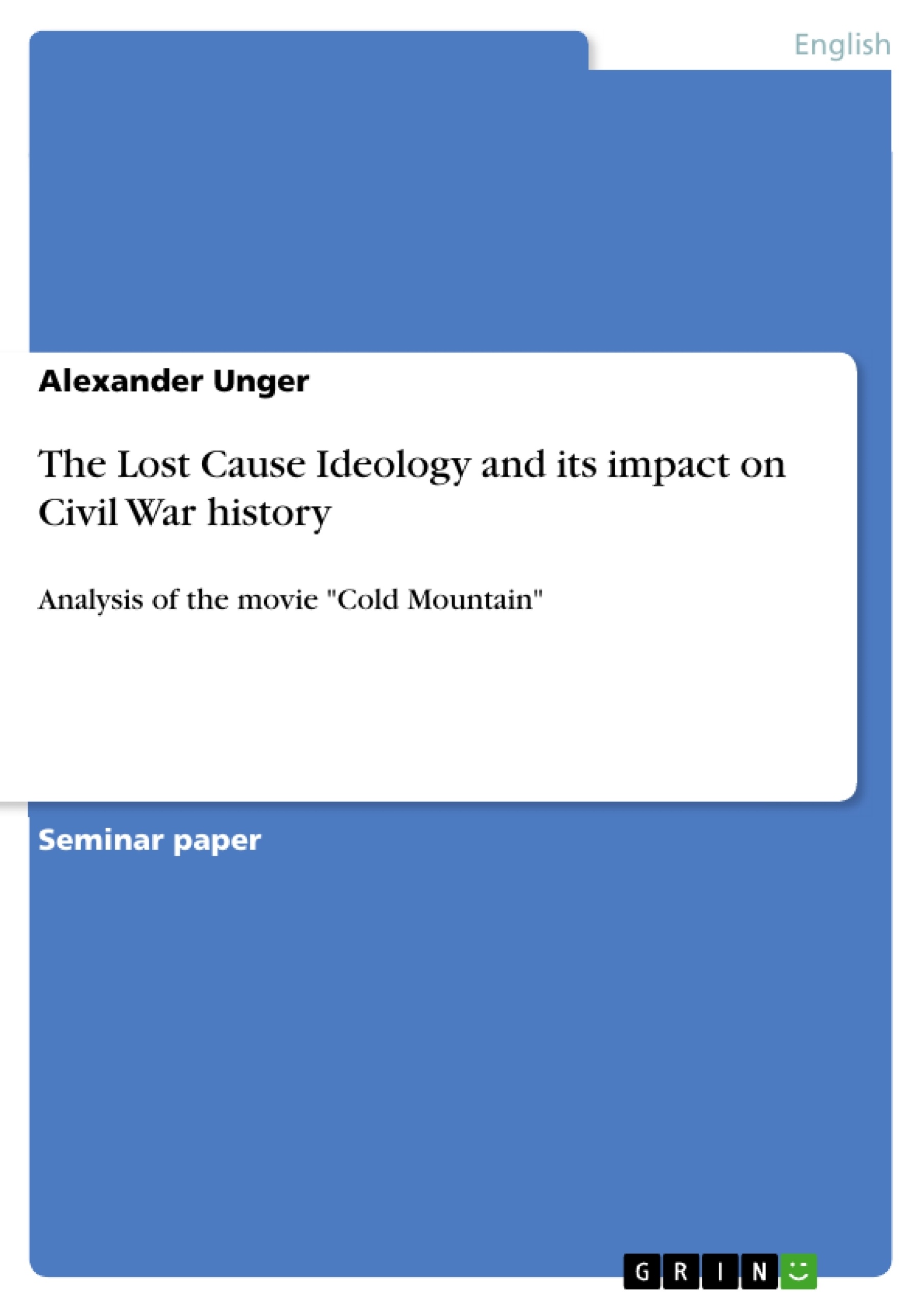The paper will briefly outline the origin and ensuing development of the Lost Cause, its content, and its impact on America's collective memory. Subsequently, I will analyze the blockbuster “Cold Mountain” (2003) in search of remnants of this presumed discarded ideology – a movie based on the bestselling novel by Charles Frazier of the same title (which I will not neglect entirely) that drew considerable numbers of moviegoers into the theaters. Although at first view a love movie and thus designed for a particular audience, the Civil War nonetheless serves as the story's setting. Therefore, it is interesting to speculate what lessons this and other audiences – in terms of Civil War history and remembrance – might draw from “Cold Mountain”.
Over the previous decades, Civil War history came under scrutiny. Concurrently, revisionist historians and cultural scientists have hinted at the inherently problematic nature of the films in question and many more following over the first decades of the 20th century: These movies depict a blatantly distorted picture of that pivotal moment in American history; distorted by an incredibly tenacious and moreover distinctively racist Southern interpretation of the Civil War and its underlying reasons that emerged during the Reconstruction era and is commonly referred to as the Lost Cause.
Table of Contents
- Introduction
- Lost Cause ideology and its impact on Civil War history
- Cold Mountain as a tale of the Lost Cause
- Conclusion
Objectives and Key Themes
This essay explores the persistence of the Lost Cause ideology, a romanticized and distorted interpretation of the American Civil War, in contemporary popular culture. The author analyzes the film adaptation of Charles Frazier's novel, "Cold Mountain," to examine how the Lost Cause narrative may still be present, despite its rejection by many historians.
- The emergence and evolution of the Lost Cause ideology
- The impact of the Lost Cause on American collective memory
- The presence of Lost Cause elements in the film "Cold Mountain"
- The role of popular culture in shaping our understanding of history
Chapter Summaries
- Introduction: This chapter introduces the concept of the Lost Cause and argues that the remembrance of the Civil War is still heavily influenced by this ideology, despite a growing consensus among historians that slavery was its main cause. It emphasizes the importance of understanding the historical context and the perpetuation of a biased collective amnesia surrounding the war.
- Lost Cause ideology and its impact on Civil War history: This chapter examines the origins and development of the Lost Cause ideology, highlighting its key tenets and its enduring influence on American society. It discusses how the ideology was used to justify the actions of the Confederacy, downplay the importance of slavery, and romanticize the South's antebellum society. It also explores the role of organizations like the Southern Historical Society in perpetuating the Lost Cause narrative.
Keywords
The key terms and concepts central to this essay are: Lost Cause ideology, American Civil War, collective memory, historical revisionism, popular culture, film adaptation, "Cold Mountain," Charles Frazier, Confederate identity, slavery, racism, and Southern history.
Frequently Asked Questions
What is the "Lost Cause" ideology?
The Lost Cause is a romanticized and distorted interpretation of the American Civil War that emerged during the Reconstruction era, often downplaying the role of slavery and portraying the Confederacy in a heroic light.
How did the Lost Cause impact American collective memory?
It created a blatantly distorted picture of history in popular culture and education, leading to a biased "collective amnesia" regarding the war's underlying racist causes.
Why is the movie "Cold Mountain" (2003) analyzed in this context?
The paper examines "Cold Mountain" to identify remnants of the Lost Cause ideology in contemporary cinema, despite modern historical revisions.
What was the role of the Southern Historical Society?
The Southern Historical Society was instrumental in documenting and perpetuating the Lost Cause narrative through various publications and organizations.
What is the consensus among modern revisionist historians regarding the Civil War?
Modern historians largely agree that slavery was the primary and fundamental cause of the American Civil War, contradicting the tenets of the Lost Cause.
How does popular culture shape our understanding of history?
Blockbuster movies and bestselling novels often serve as the primary source of historical information for the public, potentially reinforcing old myths like the Lost Cause.
- Citation du texte
- Alexander Unger (Auteur), 2009, The Lost Cause Ideology and its impact on Civil War history, Munich, GRIN Verlag, https://www.grin.com/document/1009477



